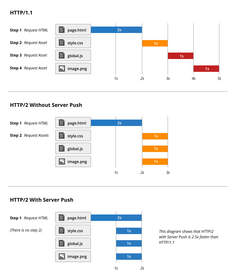SAN FRANCISCO, CA--(Marketwired - Apr 28, 2016) - CloudFlare, the leading Internet performance and security company, today introduced the industry's first-ever HTTP/2 Server Push support for all customers. HTTP/2 Server Push is the next generation Internet standard aimed at speeding up websites and mobile applications. CloudFlare is turning it on for free for all of its 4 million customers, making it possible for everyone to experience the fastest web performance available.
"Usually, Internet performance improvements shave just milliseconds. In this case, the impact of HTTP/2 Server Push will be measured in seconds per page load, a quantum leap in performance that no service provider has been able to offer yet," said Matthew Prince, co-founder & CEO of CloudFlare. "If with HTTP/2 Server Push we're able to save one second off every page load served across CloudFlare's network at our current scale, we would save about 10,000 years of time every day that people would have otherwise spent waiting for the Internet to load."
HTTP/2 Server Push enables web servers to provide content to site visitors without waiting for a request. This builds on CloudFlare's support of HTTP/2, announced last year, that automatically speeds up web properties for all customers with the latest version of Hypertext Transfer Protocol (HTTP). The initial benefit of HTTP/2 was the ability to have multiple HTTP requests share a single connection between the browser and a web server--but it still required a dedicated request for each CSS, JavaScript, or image file on a page. With HTTP/2 Server Push the resources an application needs can be proactively pushed to a device without waiting to be requested. HTTP/2 was built to improve the performance of everything from traditional websites to modern mobile apps.
Server Push is a fundamental update to HTTP/2 which was not previously available or supported by SPDY, the protocol that HTTP/2 is based on. This new HTTP/2 functionality allows a web server to send resources like images, CSS, JavaScript, and fonts back to the user before their browser even knows it needs them. This eliminates an additional round-trip for every resource in a web page, resulting in an estimated 15 percent performance increase for a typical website.
Server Push is another way CloudFlare is bringing the new standard of Internet performance to the masses. CloudFlare is the first organization to offer HTTP/2 Server Push at scale. The HTTP/2 Server Push standard is supported across modern browsers including the latest versions of Google Chrome, Mozilla Firefox, Microsoft Internet Explorer (Windows 10) and Edge. Apple Safari has HTTP/2 Server Push in beta and is expected to release support broadly soon.
"Latency is the performance bottleneck for most web applications: a single roundtrip to the server can take anywhere from tens to thousands of milliseconds, forcing the browser to wait for critical resources before it can render the page," said Ilya Grigorik, web performance engineer at Google, co-chair of the W3C Web Performance Working group, and author of High Performance Browser Networking. "Adding support for HTTP/2 Server Push for all CloudFlare-powered sites is a big and exciting step towards enabling a faster and more optimized web."
Supporting HTTP/2 Server Push furthers CloudFlare's ongoing mission to help build a faster, safer and better Internet for all. "Nearly two years ago, CloudFlare democratized access to the encrypted web by turning on free Universal SSL for all of its customers. In addition to doubling the size of the encrypted web overnight, Universal SSL paved the way for our support of of next generation Internet protocols SPDY and HTTP/2," said John Graham-Cumming, CTO, CloudFlare. "HTTP/2 Server Push will enable a whole new class of web applications. It represents the biggest change in delivery of web content since AJAX--for the first time it gives web servers the power to send assets to a web browser. This upends the way in which the web works eliminating the need for countless browser performance hacks."
Developers-- you can start experimenting with HTTP/2 Server Push today with our Implementation Guide.
To learn more about HTTP/2 and to experiment with HTTP/2 Server Push today, please check out the additional resources below.
- Announcing support for HTTP/2 Server Push
- HTTP/2 Server Push demo
- See the difference in performance over HTTP/1.1 through CloudFlare's HTTP/2 Guide
- Introducing HTTP/2 (Blog)
About CloudFlare
CloudFlare, Inc. (www.cloudflare.com / @cloudflare) is on a mission to help build a better Internet. Today the company runs one of the world's largest networks that powers more than 10 trillion requests per month, which is nearly 10 percent of all Internet requests for more than 2.5 billion people worldwide. CloudFlare protects and accelerates any Internet application online without adding hardware, installing software, or changing a line of code. Websites powered by CloudFlare have all web traffic routed through its intelligent global network, which gets smarter with each new site added. As a result, they see significant improvement in performance and a decrease in spam and other attacks. CloudFlare was recognized by the World Economic Forum as a Technology Pioneer, named the Most Innovative Network & Internet Technology Company for two years running by the Wall Street Journal, and ranked among the world's 50 most innovative companies by Fast Company. Headquartered in San Francisco, CA, CloudFlare has offices in Austin, TX, Champaign, IL, Washington, DC, London, and Singapore.
Contact Information:
Press Contact
Daniella Vallurupalli
Communications
CloudFlare
650-483-4463
press@cloudflare.com
daniella@cloudflare.com

